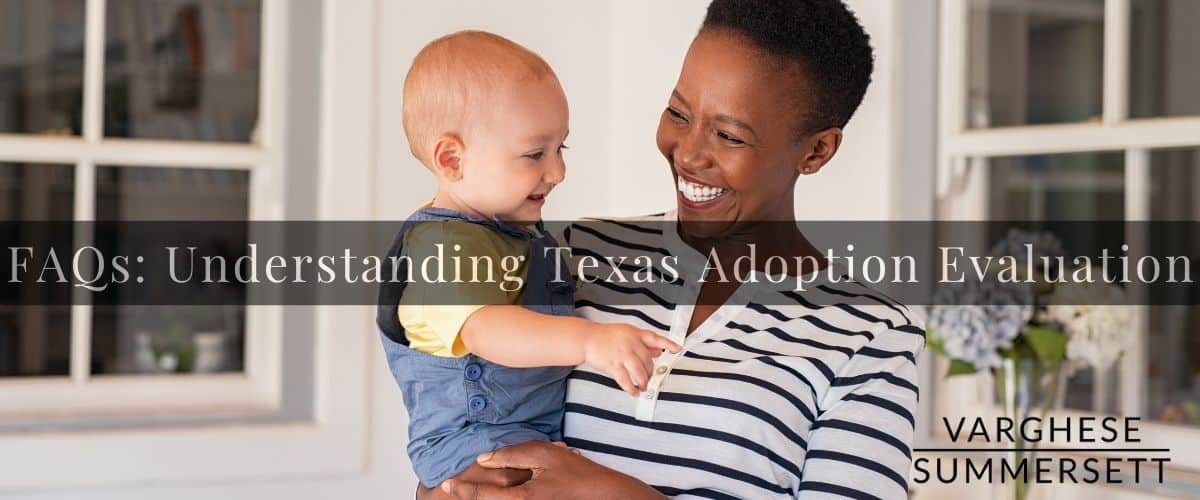
Understanding Adoption Evaluations in Texas
Texas Adoption Evaluation Guide
Adoption is a life-changing decision for both the child and the adopting family. In the state of Texas, the process is governed by the Texas Family Code and aims to ensure the best interests of the child. Before delving into the adoption evaluation process, it’s crucial to understand the types of adoption available, including private adoption, agency adoption, and adoption through the Texas Department of Family and Protective Services (DFPS).
Navigating the adoption process in Texas can be complex and emotionally challenging. The knowledgeable attorneys at Varghese Summersett Family Law Group can guide you through the process, ensuring your adoption journey is as smooth as possible. Don’t wait to secure the best outcome for your family. Call Varghese Summersett today at 817-900-3220 or contact us online.
Please also take a moment to explore our guide on Texas adoption laws, the adoption process, adoption professionals, and how Varghese Summersett can help you navigate your adoption journey.
Texas Adoption Laws and Requirements
Before beginning the adoption process in Texas, it’s important to familiarize yourself with the state’s adoption laws and requirements. Some key aspects of Texas adoption laws include:
- Prospective adoptive parents must be at least 21 years old.
- Adoptive parents must undergo a criminal background check.
- A home study is mandatory, evaluating the family’s living situation and stability.
- There is a mandatory waiting period of six months after filing the petition for adoption before the adoption can be finalized.
The Adoption Evaluation Process in Texas
Home Study Assessment
One of the most critical steps in the adoption process in Texas is the home study. This adoption evaluation assesses the prospective adoptive family’s suitability, including their living environment, financial stability, and emotional readiness. The home study consists of interviews, home visits, background checks, and a review of personal and financial documents.
Finding a Child
After completing the home study, prospective adoptive parents can find a child through various means, including state agencies, private adoption agencies, or independent adoption. Private adoption laws in Texas regulate the process when adoptive parents work directly with the birth parents or a facilitator. Children 12 years or older must consent to the adoption.
Terminate Parental Rights
To proceed with an adoption in the state of Texas, the biological parent’s rights must be terminated. This can be done voluntarily or, in some cases, through a court order. The termination of parental rights clears the way for the adoptive parents to legally assume the role of the child’s parents.
Texas Petition for Adoption and Waiting Period
Once the home study has been completed and approved, the next step in the adoption process is filing a Texas Petition for Adoption with the court. This legal document formally requests the court to grant the adoption and establishes the adoptive parent’s rights and responsibilities.
After filing the petition, Texas adoption laws require a waiting period before the finalization of the adoption. The waiting period can range from 30 to 90 days, depending on the specific circumstances of the case. This time allows for any necessary background checks, counseling, or additional adoption evaluations to take place.
Adoption Finalization Hearing
At the adoption hearing, the judge will review the case, hear testimony, and ultimately decide whether to grant the adoption. If the adoption is approved, the adoptive family will be awarded legal custody of the child.
Post-Placement Supervision
After a child has been placed with the adoptive family, a period of post-placement supervision begins. This supervision typically lasts six months, during which a caseworker monitors the child’s well-being and the family’s adjustment. Regular visits and reports are required throughout this period.
Special Circumstances in Texas Adoption
Adopting a Grandchild in Texas
Grandparents seeking to adopt their grandchild in Texas must follow the same legal process as other prospective adoptive parents. This includes completing a home study adoption evaluation and filing a Texas Petition for Adoption. In some cases, grandparents may be given preference over non-relative adoptive parents, particularly when the biological parents are unable to care for the child.
Can an Adoption be Reversed in Texas?
In rare cases, an adoption may be reversed in Texas. The process typically involves proving that the termination of the biological parent’s rights was not in the child’s best interest or that the adoption was obtained through fraud, duress, or coercion. It’s crucial to seek legal guidance from our private adoption lawyer in Texas
In a private adoption, prospective parents work directly with an adoption attorney and or adoption agency to adopt a child without the involvement of the Texas Department of Family and Protective Services. Texas private adoption laws regulate these adoptions to ensure the best interests of the child are protected.
Private adoptions in Texas are governed by the Texas Family Code. In a private adoption, the birth parents voluntarily relinquish their parental rights, allowing the adoptive parents to legally adopt the child.
Some key aspects of private adoption laws in Texas include:
Consent to adoption: Birth parents must give consent to the adoption, which is typically done through an Affidavit of Voluntary Relinquishment of Parental Rights. Consent can be given at any time after the child’s birth.
Revocation of consent: In Texas, prospective birth mothers and parents have a limited time to revoke their adoption consent. This period is 48 hours after the child’s birth or when the birth parent signs the relinquishment affidavit, whichever is later.
Interstate adoptions: The Interstate Compact on the Placement of Children (ICPC) must be followed if the child and adoptive parents reside in different states. This involves obtaining approval from both states’ ICPC offices before the child can be placed with the other hopeful adoptive parents or family.
Understanding Texas Adoption Laws and Requirements
Texas adoption laws establish specific requirements for prospective adoptive parents, such as age, residency, and marital status. These requirements are designed to ensure that the adoptive parents are capable of providing a suitable home for the child.
Age and Residency Requirements
In Texas, individuals must be at least 21 years old to adopt a child from foster care. Additionally, they must be financially stable and responsible, have a stable place to live, and be willing to undergo a background check and complete a home study.
Marital Status
Texas allows single individuals, married couples, and same-sex couples to adopt. However, if a married individual wishes to adopt without their spouse, they must meet specific criteria outlined in the Texas Family Code adoption regulations.
Waiting Period
Texas adoption laws require a waiting period before finalizing the adoption. Typically, this waiting period is six months from the time the child is placed with the adoptive family. However, the court may waive or shorten this waiting period in certain circumstances, such as if the adoptive parents have completed a pre-adoptive home screening or if the child is related to the adoptive parent or family within a certain degree of consanguinity.
Qualifications for Adoption in Texas
To be eligible to adopt in the state of Texas, prospective adoptive parents must meet certain qualifications. These include:
- Being at least 21 years old
- Being financially stable
- Providing personal and employer references
- Passing a criminal history background check
- Completing a home study or home screening
- Participating in an adoption education program
Need adoption guidance in Texas? Call Varghese Summersett Today.
Navigating the whole adoption law process in Texas can be complex and challenging, but you don’t have to go through it alone. The experienced family law attorneys at Varghese Summersett are here to guide you every step of the way. Whether you’re looking to adopt a grandchild, understand the Texas adoption laws, or explore private adoption laws in Texas, our team can provide you with the legal expertise and support you need. Don’t wait any longer – call us today at 817-900-3220 or contact us online to get started on your adoption journey.
FAQs: Adoption Evaluations in Texas
What is an adoption evaluation in Texas?
An adoption evaluation, also known as a home study, is a comprehensive assessment of prospective adoptive parents’ suitability to adopt a child. It is required by Texas Family Code Adoption and is an essential part of the adoption process in Texas.
What are the qualifications for adoption in Texas?
To be eligible to adopt in Texas, prospective adoptive parents must meet the following qualifications:
- Be at least 21 years old.
- Complete a written application with a licensed adoption agency.
- Provide references attesting to their character and ability to parent.
- Complete a home study, including background checks and home visits.
- Attend training on adoption-related issues.
What is the adoption process in Texas?
The adoption process in Texas generally involves the following steps:
- Complete an application with a licensed adoption agency.
- Attend adoption training.
- Undergo an adoption evaluation or home study.
- Obtain approval from the adoption agency.
- Get matched with a child.
- Complete a Texas petition for adoption.
- Fulfill the Texas adoption laws waiting period.
- Finalize the adoption in court.
What are the private adoption laws in Texas?
Texas law requires prospective adoptive parents to adhere to specific rules in private adoptions, including advertising restrictions, financial assistance limitations for birth mothers, and voluntary post-placement contact agreements.
What is the Texas adoption laws waiting period?
The waiting period in Texas adoption laws is typically six months from the time the child is placed with the adoptive family. However, the court may waive or shorten this waiting period under certain circumstances.
Can an adoption be reversed in Texas?
Reversing an adoption in Texas is possible but rare. It typically requires proving fraud, duress, or other significant legal issues that would warrant the court to nullify the adoption.
How do I adopt my grandchild in Texas?
To adopt a grandchild in Texas, grandparents must meet the qualifications for adoption, complete the adoption evaluation, and follow the adoption process, similar to other types of adoption.
How does open adoption this work in Texas?
Adoption in Texas works by finding a suitable and loving home for a child who needs it. Prospective adoptive parents must meet specific qualifications, undergo a thorough adoption evaluation, and complete the legal process before finalizing the adoption.
What are the Texas adoption rules regarding advertising?
Texas adoption rules state that only licensed child-placing and foster care adoption agencies or attorneys can advertise adoption services. This is to ensure that prospective adoptive parents and birth parents are protected from unethical practices.
What is the role of the court in Texas adoptions?
The court plays a crucial role in the adoption process in Texas. It reviews and approves the adoption evaluation, grants the Texas petition for adoption, and finalizes the adoption once all legal requirements have been met.



